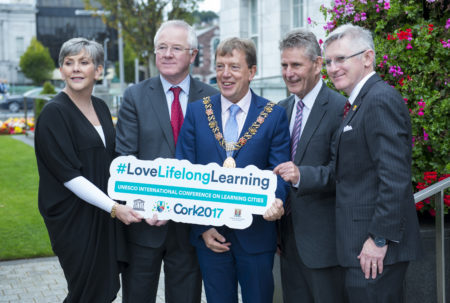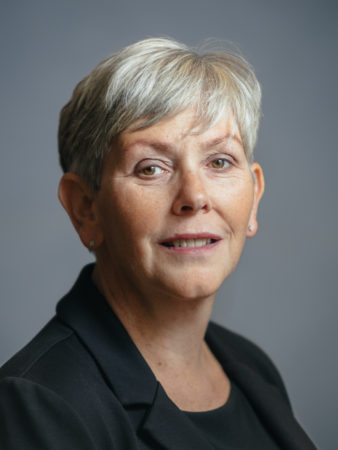19 September 2017
By Tom Collins
tom@TheCork.ie
Cork Learning Partners (Cork City Council, Cork Education and Training Board, University College Cork and Cork Institute of Technology) yesterday (Monday 18th September) announced the launch of a series of How-To learning guides for other Learning Cities across the world.

During their keynote address, at the opening day of the UNESCO’s third International Conference on Learning Cities, hosted in Cork, the Partners explained the theme and rationale behind these two publications –How to Organise a Lifelong Learning Festival and Cork’s Learning Neighbourhoods.
More than 650 delegates from 92 countries across the world who were in attendance at the opening day of the Conference were witness to this announcement from the Cork Partners. The Partners were especially proud to announce these guides at the global UNESCO Conference as it is the first time that the event has been hosted in a European country.
It is unusual for four, rather than one speaker, to give a Keynote Address, but that was the case today when Cork spoke with one voice on their Learning City and its projects.
The four speakers were:
- Ann Doherty, CE, Cork City Council;
- Ted Owens, CE, Cork Education & Training Board;
- Barry O’Connor, President, Cork Institute of Technology;
- and Pat O’Shea, President, University College Cork.
Ann Doherty, CE at Cork City Council commenced the Partners’ presentation saying that ‘at the heart of the Cork learning success story has been the cooperation, partnership and collaboration of the four key partners which continues to grow from strength to strength as we work with other partners such as the HSE, ensuring that it’s the people of Cork that come first throughout.’

Ann Doherty is Chief Executive of Cork City Council
The four partners were unified in how they presented the history and the future of Cork as a Learning City, citing examples of good practice in Cork to delegates from cities across the globe.
UNESCO defines a Learning City as a city that effectively mobilises its resources in every sector to promote a culture of learning throughout life. Cork has a great track record in working collaboratively across sectors to achieve the goal of developing Cork as a Learning City.
Commenting on the publications presented by the Cork Partners, Mr. Stanley Mutumba Simataa, President of the General Conference UNESCO said;
‘The presentation given by the Cork partners was an excellent example of how to develop a Learning City strategy and provided many of the examples which reflect how the Sustainable Development Goals can be put into local action in order to enhance the provision of education and lifelong learning opportunities.’
As well as the two How-To guides, they launched a work in progress: Cork – Learning City: Past, Present & Exploring Our Future by Denis Barrett, recently appointed Cork Learning City Co-ordinator, laying out plans for its development.
How to Organise a Lifelong Learning Festival is written by Tina Neylon, Cork Lifelong Learning Festival Co-ordinator. Cork Learning Neighbourhoods is by Dr Siobhán O’Sullivan & Lorna Kenny, Centre for Adult Continuing Education (ACE), University College Cork, who co-ordinate the project.
Introducing the Learning Festival How to Guide, Cork Education and Training Board Chief Executive Ted Owens said, ‘Central to the success of the festival has been the sense of ownership it has across the communities of Cork and this is demonstrated each year by the extensive range of activities they bring to the programme through their voluntary efforts and which are provided free of charge.’
Cork is fast being recognised internationally as a leading hub for lifelong learning and for developing good practice, for example with its hugely successful annual festival over 14 years, and four Learning Neighbourhoods established in the last two years. Reference was also made to Music Generation Cork which offers music classes to young people citywide.
For more information on the UNESCO Third International Conference on Learning Cities and to see the full conference programme go to the website www.learningcities2017.org or keep up to date with live online updates by following #learningcities2017 or check out Facebook pageCorkLearning or Twitter @Corklearning.
Facts and figures:
UNESCO’s Key Features of Learning Cities (Award Criteria)
The Pediment – three areas of focus reflect the wider benefits of building a modern learning city, broadly defined as:
- Individual empowerment and social cohesion
- Economic development and cultural prosperity
- Sustainable development
Six areas of focus reflect the major building blocks of a learning city:
- Inclusive learning in the education system;
- Revitalized learning in families and communities;
- Effective learning for and in the workplace;
- Extended use of modern learning technologies;
- Enhanced quality in learning; and
- A vibrant culture of learning throughout life.
The Foundational Steps – three areas of focus reflect the fundamental conditions for building a learning city:
- Strong political will and commitment;
- Governance and participation of all stakeholders; and
- Mobilization and utilization of resources.
What is a UNESCO Learning City?
A Learning City is a city which effectively mobilizes its resources in every sector to
• promote inclusive learning from basic to higher education;
• revitalize learning in families and communities;
• facilitate learning for and in the workplace;
• extend the use of modern learning technologies;
• enhance quality and excellence in learning; and
• foster a culture of learning throughout life.
In so doing it will create and reinforce individual empowerment and social cohesion, economic and cultural prosperity, and sustainable development.

